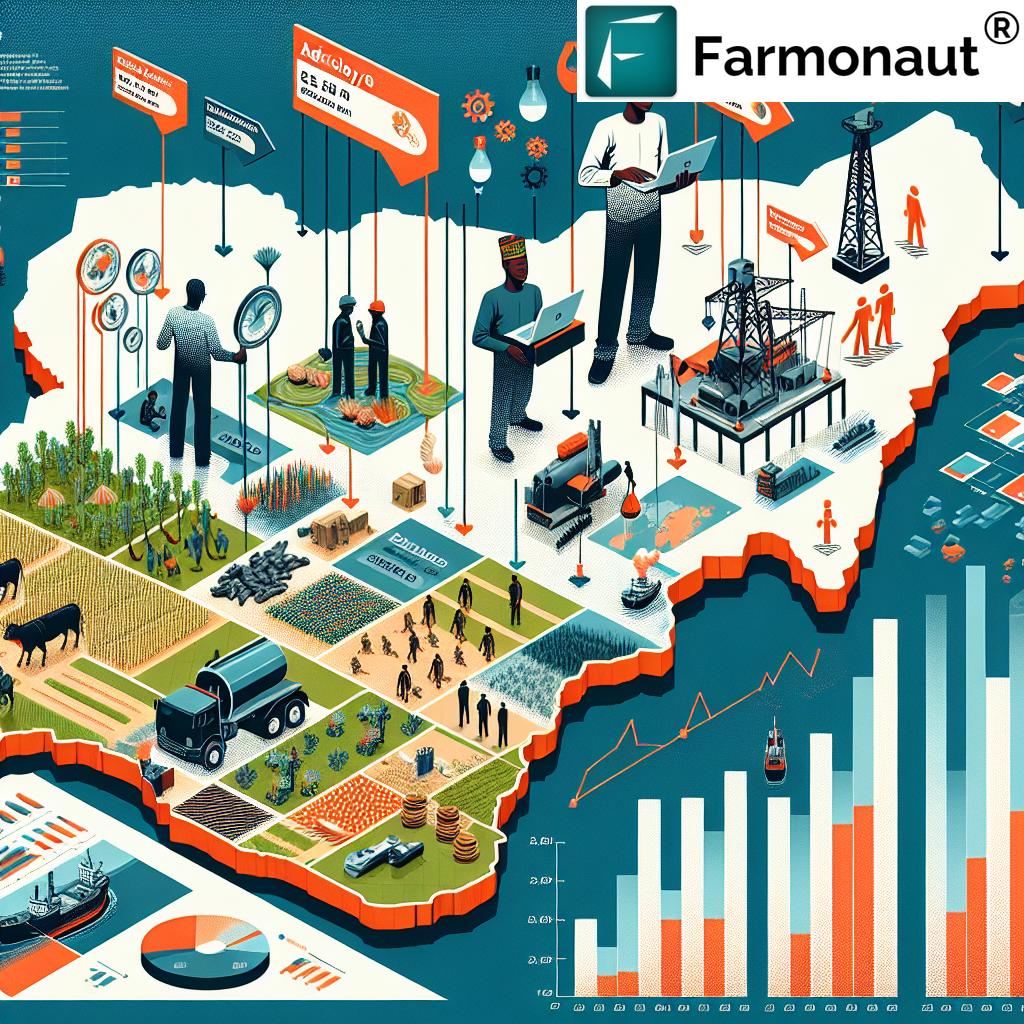Revolutionizing Nigerian Agriculture: How Farmonaut’s Technology Boosts Employment and Trade Across Sectors

“Trade has become the dominant sector for female employment in Nigeria, surpassing agriculture.”
In the ever-evolving landscape of Nigerian agriculture and employment, we’re witnessing a remarkable transformation that’s reshaping the nation’s economic fabric. As we delve into the latest trends revealed by the Nigeria General Household Survey-Panel (Wave 5) for 2023/2024, conducted by the National Bureau of Statistics (NBS), we uncover a fascinating shift in wage employment patterns across various sectors. This comprehensive analysis not only highlights the changing dynamics of the labor market but also underscores the pivotal role that agricultural technology, particularly solutions offered by companies like Farmonaut, can play in boosting productivity and sustainability.
The Changing Face of Nigerian Employment
The survey results paint a vivid picture of Nigeria’s employment landscape, revealing striking gender-based disparities and sector-specific trends. Let’s break down these findings:
- Trade Dominance: Remarkably, trade has emerged as the leading sector for female wage employment, accounting for 38.5% of women’s jobs compared to 18% for men.
- Agricultural Stronghold: While trade takes the lead for women, agriculture remains a powerhouse for male employment, representing 35.2% of jobs for men.
- Urban-Rural Divide: In urban areas, trade eclipses agriculture as the primary source of wage employment, with 47% of female workers and 20.3% of male workers engaged in this sector.
- Regional Variations: The North Central zone still sees agriculture as the dominant employer (61% of males and 43.3% of females), while the North West shows a stronger presence of trade (41.4% of females and 30.1% of males).
These trends reflect a complex interplay of factors, including urbanization, changing economic structures, and evolving gender roles in the workforce. As we navigate through these changes, it’s crucial to consider how technological advancements, particularly in agriculture, can further transform employment patterns and boost economic resilience.
The Role of Agricultural Technology in Shaping Employment
In this dynamic environment, agricultural technology plays a pivotal role in enhancing productivity and creating new employment opportunities. Farmonaut, a leading provider of advanced agricultural solutions, offers innovative tools that can significantly impact the sector:
- Satellite-Based Crop Monitoring: By leveraging satellite imagery, Farmonaut enables farmers to monitor crop health remotely, optimizing resource allocation and improving yields.
- AI-Driven Advisory Systems: The Jeevn AI system provides personalized farm management advice, helping farmers make data-driven decisions.
- Blockchain-Based Traceability: This technology enhances supply chain transparency, crucial for Nigeria’s agricultural exports.
To explore these cutting-edge solutions, visit the Farmonaut web app or download the mobile apps:
Agricultural Employment in Nigeria: A Closer Look
Despite the rise of trade, agriculture remains a cornerstone of Nigeria’s economy and employment landscape. The sector accounts for 27% of female and 35.2% of male employment, underscoring its continued importance. Let’s examine the key aspects of agricultural employment:
- Crop Production: This sub-sector remains the largest employer within agriculture, with a focus on staple crops like cassava, yams, and maize.
- Livestock Farming: An increasingly important component, providing both employment and food security.
- Fisheries and Aquaculture: Growing sectors that offer diverse employment opportunities, especially in coastal regions.
- Forestry: While smaller in scale, it plays a crucial role in environmental management and rural employment.
The integration of technologies like those offered by Farmonaut can significantly enhance productivity across these sub-sectors. For instance, satellite-based crop monitoring can help farmers optimize irrigation and fertilizer use, potentially leading to higher yields and increased employment in related services.
The Rise of Trade and Its Impact on Employment
The survey’s revelation of trade as the dominant sector for female employment marks a significant shift in Nigeria’s economic landscape. This trend is largely attributed to:
- Oil and Gas Exports: Nigeria’s extensive oil and gas exports, primarily crude oil and petrol, drive much of the trade sector’s growth.
- Wholesale and Retail: These sub-sectors play a crucial role in enhancing both domestic and international commerce.
- Informal Trade: A significant portion of trade employment, especially for women, occurs in the informal sector.
“Nigeria’s oil and gas exports account for over 90% of the country’s foreign exchange earnings.”
While the dominance of trade presents opportunities, it also highlights the need for diversification. Agricultural technology can play a role here by enhancing the value of agricultural exports and creating new trade opportunities in agri-tech products and services.
Urban vs. Rural Agriculture: Bridging the Divide
The survey reveals a stark contrast between urban and rural employment patterns, particularly in agriculture:
- Urban Areas: Trade dominates, with 47% of female workers and 20.3% of male workers engaged in this sector.
- Rural Regions: Agriculture remains the primary employer, especially for men.
This urban-rural divide presents both challenges and opportunities. Urban agriculture, supported by technologies like Farmonaut’s AI-driven advisory systems, can help bridge this gap by bringing modern farming practices to cities. For example, vertical farming and precision agriculture techniques can create new employment opportunities in urban areas while contributing to food security.
For those interested in leveraging technology for urban or rural agriculture, Farmonaut’s API offers powerful tools for developers and businesses. Detailed documentation is available in the API Developer Docs.
Nigerian Agricultural Exports: Challenges and Opportunities
While oil and gas dominate Nigeria’s exports, agricultural products play a significant role in diversifying the economy and creating employment. Key aspects include:
- Major Export Crops: Cocoa, cashew nuts, and sesame seeds are among Nigeria’s top agricultural exports.
- Quality Control: Ensuring product quality is crucial for competing in international markets.
- Market Access: Improving infrastructure and trade relationships to expand export opportunities.
Farmonaut’s blockchain-based traceability solutions can significantly enhance the credibility and value of Nigerian agricultural exports. By providing transparent, verifiable information about product origin and quality, these technologies can help Nigerian farmers and exporters access premium markets and command better prices.
Crop Production Statistics and Technological Intervention
Understanding crop production statistics is crucial for optimizing agricultural employment and productivity. Let’s look at some key figures and how technology can enhance these areas:
- Cassava Production: Nigeria is the world’s largest producer, with an annual output of about 59 million tonnes.
- Yam Cultivation: The country accounts for over 60% of the world’s yam production.
- Maize and Rice: Significant crops for both domestic consumption and potential export.
Farmonaut’s satellite-based crop health monitoring can revolutionize how these crops are managed. By providing real-time data on vegetation health (NDVI) and soil moisture levels, farmers can make informed decisions about irrigation, fertilizer usage, and pest management. This not only increases yields but also creates new skilled job opportunities in agricultural data analysis and precision farming.
Livestock Farming Employment: A Growing Sector
Livestock farming is an increasingly important component of Nigeria’s agricultural sector, offering diverse employment opportunities:
- Poultry: A rapidly growing sub-sector, providing both meat and eggs.
- Cattle Rearing: Important for meat and dairy production, with potential for export.
- Small Ruminants: Goats and sheep provide livelihoods for many rural families.
Farmonaut’s technologies can benefit livestock farmers through improved pasture management and resource allocation. The AI-driven Jeevn advisory system can provide insights on optimal grazing patterns, disease prevention, and market trends, potentially increasing productivity and creating new specialized roles in livestock management.
Agricultural Technology Adoption: Challenges and Solutions
While the potential of agricultural technology is vast, its adoption in Nigeria faces several challenges:
- Digital Literacy: Many farmers lack the skills to utilize advanced technologies.
- Infrastructure: Limited internet connectivity and power supply in rural areas.
- Cost: Initial investment in technology can be prohibitive for small-scale farmers.
To address these challenges, Farmonaut offers:
- User-Friendly Interfaces: Designed for ease of use, even for those with limited digital experience.
- Offline Capabilities: Many features work without constant internet connectivity.
- Scalable Solutions: Options for farmers of all sizes, from smallholders to large agribusinesses.
By overcoming these barriers, we can accelerate the adoption of agricultural technology, leading to increased productivity and new job opportunities in the agri-tech sector.
Agribusiness Opportunities: Beyond Traditional Farming
The evolution of Nigeria’s agricultural sector is creating numerous agribusiness opportunities that extend beyond traditional farming practices:
- Food Processing: Adding value to raw agricultural products.
- Agricultural Input Supply: Providing seeds, fertilizers, and equipment.
- Agri-tech Services: Offering technological solutions for farm management.
- Logistics and Transportation: Ensuring efficient movement of agricultural products.
Farmonaut’s solutions can support these agribusinesses by providing valuable data and insights. For instance, the company’s satellite monitoring can help food processors predict crop yields and plan their operations accordingly. Similarly, input suppliers can use Farmonaut’s data to optimize their inventory and distribution strategies.
Sustainable Farming Practices: A Path to Resilience
Adopting sustainable farming practices is crucial for long-term agricultural resilience and employment stability in Nigeria. Key areas include:
- Conservation Agriculture: Minimizing soil disturbance and maintaining crop diversity.
- Water Management: Implementing efficient irrigation systems and rainwater harvesting.
- Agroforestry: Integrating trees with crops or livestock for environmental and economic benefits.
Farmonaut’s technology supports these sustainable practices by providing precise data on soil health, water usage, and crop performance. The company’s AI advisory system can guide farmers in implementing these practices effectively, potentially creating new roles in sustainable agriculture consulting and environmental management.
The Future of Nigerian Agriculture and Employment
As we look to the future, the integration of technology in Nigerian agriculture holds immense potential for reshaping employment patterns and boosting economic growth. Key trends to watch include:
- Precision Agriculture: Increasing adoption of data-driven farming techniques.
- Digital Marketplaces: Connecting farmers directly with consumers and reducing intermediaries.
- Climate-Smart Agriculture: Adapting farming practices to climate change challenges.
Farmonaut is at the forefront of these trends, offering solutions that not only enhance agricultural productivity but also create new employment opportunities in areas such as data analysis, precision farming, and agri-tech services.
Conclusion: Embracing Technology for Agricultural Transformation
The changing landscape of Nigerian employment, particularly in agriculture and trade, presents both challenges and opportunities. By embracing agricultural technology, such as the solutions offered by Farmonaut, Nigeria can enhance its agricultural productivity, create new employment opportunities, and strengthen its economic resilience.
As we move forward, the integration of satellite monitoring, AI-driven advisory systems, and blockchain-based traceability will play a crucial role in shaping the future of Nigerian agriculture. These technologies not only promise to boost crop yields and improve resource management but also to create a new wave of skilled employment in the agricultural sector.
For farmers, agribusinesses, and policymakers looking to leverage these technologies, Farmonaut offers a comprehensive suite of tools to drive agricultural innovation and sustainability. By adopting these solutions, Nigeria can position itself at the forefront of agricultural transformation in Africa, ensuring food security, economic growth, and employment opportunities for generations to come.

Farmonaut Subscriptions
Frequently Asked Questions (FAQ)
- How is agricultural employment changing in Nigeria?
Agricultural employment remains strong, especially for males, but there’s a shift towards trade, particularly for females in urban areas. - What role does technology play in Nigerian agriculture?
Technology, such as Farmonaut’s solutions, is enhancing productivity through satellite monitoring, AI advisory systems, and blockchain traceability. - How can farmers benefit from Farmonaut’s technologies?
Farmers can optimize resource use, improve crop health, and make data-driven decisions using Farmonaut’s satellite-based monitoring and AI advisory systems. - What are the main challenges in adopting agricultural technology in Nigeria?
Key challenges include digital literacy, infrastructure limitations, and the initial cost of technology adoption. - How does the urban-rural divide affect agricultural employment?
Urban areas see more employment in trade, while rural regions still rely heavily on agriculture, creating a need for balanced development strategies.
| Sector | Male Employment (%) | Female Employment (%) | Total Employment (%) |
|---|---|---|---|
| Agriculture | 35.2 | 27.0 | 31.1 |
| Trade | 18.0 | 38.5 | 28.3 |
| Manufacturing | 7.2 | 12.2 | 9.7 |
| Oil & Gas | 3.5 | 0.5 | 2.0 |
| Services | 36.1 | 21.8 | 28.9 |
| Urban Employment | 20.3 | 47.0 | 33.7 |
| Rural Employment | 79.7 | 53.0 | 66.3 |
This comprehensive analysis of Nigerian agricultural employment and the role of technology in shaping its future underscores the importance of embracing innovative solutions. As we’ve seen, companies like Farmonaut are at the forefront of this agricultural revolution, offering tools that can significantly boost productivity, create new job opportunities, and contribute to the overall economic resilience of Nigeria.


















